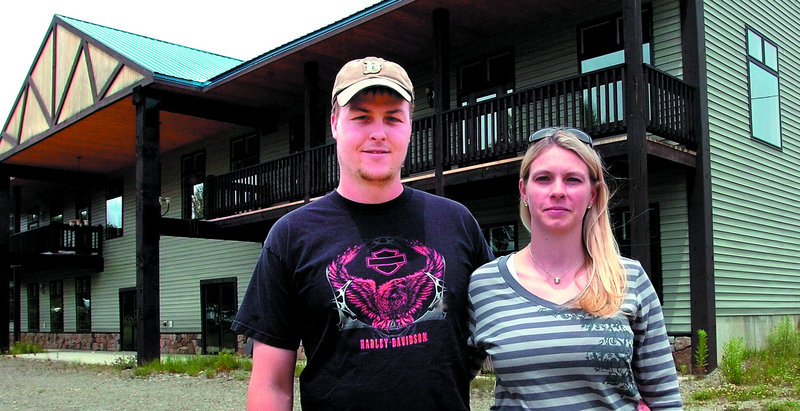FARMINGTON – A local contractor knows that his plan to operate half of the state’s medical marijuana dispensaries is ambitious.
But a hefty application fee and competitive selection process haven’t kept Luke Sirois from trying.
When state voters approved medical marijuana dispensaries in November, a lot of people had the same idea as Sirois — to get in early on Maine’s newest business.
The $15,000 application fee, however, deterred many of them. Still, there likely will be between 20 and 40 applicants vying to run at least one of the state’s eight dispensaries, according to Jonathan Leavitt, executive director of the Maine Marijuana Policy Initiative.
Sirois, who owns Western Maine Electrical and Excavation, hopes to open four of them.
“We’re applying for four because we know we can handle four,” Sirois said Wednesday. “If we could get one, we’d feel like we accomplished our mission.”
Applications are due to the state by June 25, and the Department of Health and Human Services will announce its selections July 9. The state will return all but $1,000 of the fee to applicants who aren’t selected.
Sirois said it’s been a full-time job for two months putting together the applications to open dispensaries in four locations, from York County to Bangor.
He said he’s already spent $10,000 on legal advice, building plans and countless gallons of gas. And that’s not to mention the extra money he’s paying employees at Western Maine Electrical and Excavation to keep things running smoothly while he and his wife, Lisa, focus on the dispensary plan.
Sirois said he’s already received local approval to operate dispensaries in Farmingdale and Wilton.
On Monday, he’ll face the Farmington Planning Board for a review of his proposal to turn a former Rite Aid into a dispensary, greenhouse, garden store and health center.
The concept, called Ahead Care, would be the same for all the sites. Sirois said he would need to hire between six and 10 employees to run each center.
The dispensary portion would sell a variety of strains of medical marijuana, as well as food and tinctures that contain the medicine. The crop would be cultivated in an adjacent greenhouse, and a garden store would sell tools and seeds for patients and caregivers to grow their own.
Eventually, Sirois hopes the centers would house offices for health professionals, such as pain specialists and massage therapists.
Applicants aren’t required to secure specific sites for the dispensaries, but Sirois hopes the extra legwork will bolster his chances of being selected by the state.
“I think it’s going to be very competitive,” said Catherine Cobb, director of DHHS’ Licensing and Regulatory Services Division.
Two weeks before the deadline, Cobb said, she had yet to receive an application. She suspects that’s because the paperwork is considered public record as soon as it’s submitted, and applicants don’t want to reveal their plans to competitors.
When Sirois first started looking into running a dispensary, he said, there was a community of people with the same idea, sharing thoughts about how to make it happen.
But after the state announced, in the first year of the new law, there would be only eight dispensaries allowed, former collaborators became competitors.
In the rules regulating the dispensary system, the state is divided up into eight districts. According to Cobb, there’s more than one group planning to apply to run all eight dispensaries, though she declined to identify them.
One applicant that’s known to be interested in running dispensaries in the state is the Berkeley Patients Group, which describes itself on its website as “one of California’s largest and most respected medical cannabis collectives.”
Brad Senesac, the Berkeley Patients Group’s communications director, did not return calls seeking comment last week.
Sirois said he thinks it’s unlikely that an out-of-state group would be chosen to run Maine’s entire dispensary system. He also thinks it would be an unpopular decision.
“That’s not what Maine people want to see,” he said.
But there are plenty of local groups working on applications, as well.
Sirois said he’s most confident about his chances of being selected to run a dispensary in the western district of Franklin, Oxford and Androscoggin counties.
He already has the town of Wilton’s approval to operate out of a vacant building by Dexter Supply on Route 2. If the Farmington Planning Board gives site plan approval for the former Rite Aid on Monday, Sirois would be able to choose between the two sites.
But, even in that district, he’s not a shoo-in.
According to Poland Town Manager Dana Lee, a group of women operating as Green Therapy of Maine has met with town officials, who were receptive to the idea of having a dispensary in Poland.
“I think they came out enthused,” Lee said about the group’s reaction to meeting with the Poland Planning Board.
In the end, however, a lot of applicants’ efforts will be all for naught. Sirois just hopes he’s not one of them.
“I’d be very disappointed to do all this work and get nothing out of it,” he said.
Send questions/comments to the editors.



Success. Please wait for the page to reload. If the page does not reload within 5 seconds, please refresh the page.
Enter your email and password to access comments.
Hi, to comment on stories you must . This profile is in addition to your subscription and website login.
Already have a commenting profile? .
Invalid username/password.
Please check your email to confirm and complete your registration.
Only subscribers are eligible to post comments. Please subscribe or login first for digital access. Here’s why.
Use the form below to reset your password. When you've submitted your account email, we will send an email with a reset code.